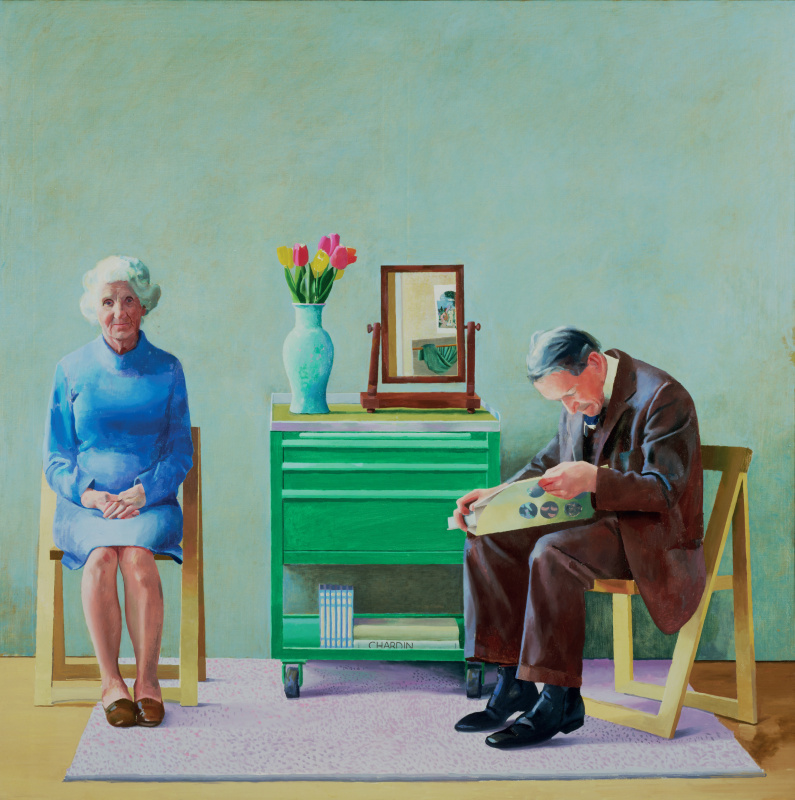log in
Enter site
Login to use Arthive functionality to the maximum
My parents
David Hockney • Painting, 1977, 183×183 cm
Description of the artwork «My parents»
David Hockney (born 1937) was the first British artist to act like a pop star, famous and glamorous from the moment he graduated from the Royal College of Art as gold medal-winner in 1962. British pop art started before American pop art (with Richard Hamilton and Eduardo Paolozzi in the 1950s), but it was Hockney, a young man dealing with love, sex and the modern world, who captured the public imagination in paintings with graffiti-like slogans such as "I will love you at 8pm next Wednesday" and the Beatles-like comic pathos of his 1962 work A Man Stood in Front of His House With Rain Descending.
By the 1970s, Hockney was discontented with fame; the film A Bigger Splash, a fascinating document of his iconic status and move to the US, distressed him with its intrusion (read about the film in the description of the Hockney’s picture, which became the key line of the film). A year before his father's death, the artist captures Kenneth and Laura Hockney in the picture My parents using the style that became his business card: a lot of light, a lot of blue, almost photographic accuracy.
The characters in Hockney’s My Parents are placed in seems minimalistic and extremely simple interior, so as not to distract the spectator’s attention from the main focus of the canvas. The painting is poised between art and life, between Hockney's intellectual interests as a painter and his desire to put his parents before us. It is full of symbolic objects and clues, like an Old Master painting. The reflection of a postcard of Piero della Francesca's The Baptism of Christ in the mirror on the cabinet suggests his parents’ Christian values. The artist originally attempted a version of this artwork with his own face in the mirror. Kenneth Hockney, immersed in reading, seems to be completely oblivious to his son (unlike Laura, who took a pose as if for a photograph and radiates her inner warmth), reads the book Art and Photography by Aaron Scharf. Hockney was living in Paris when he began this painting. On the cabinet shelf is Proust's Remembrance of Things Past and a book on Jean Baptiste Chardin, the 18th-century French painter of intimate, enigmatic scenes of domestic life. Chardin’s clean, simple world is reflected in the purity of Hockney's painting: a calm, steady light pours in from the left, giving his mother's hair a stellar brightness. Her blue dress has a silvery sheen, as does the light catching his father's face. His father's brown suit and position in the picture take him further from the light. Together they are a formidable double act.
This picture My Parents is the David’s nostalgia for his childhood, for the simple and understandable world. Besides, it is the analysis of the past and the declaration of love: the artist realizes that art has wrenched him out of his usual life and alienated him from his parents, therefore he used it to get closer to them.
By the 1970s, Hockney was discontented with fame; the film A Bigger Splash, a fascinating document of his iconic status and move to the US, distressed him with its intrusion (read about the film in the description of the Hockney’s picture, which became the key line of the film). A year before his father's death, the artist captures Kenneth and Laura Hockney in the picture My parents using the style that became his business card: a lot of light, a lot of blue, almost photographic accuracy.
The characters in Hockney’s My Parents are placed in seems minimalistic and extremely simple interior, so as not to distract the spectator’s attention from the main focus of the canvas. The painting is poised between art and life, between Hockney's intellectual interests as a painter and his desire to put his parents before us. It is full of symbolic objects and clues, like an Old Master painting. The reflection of a postcard of Piero della Francesca's The Baptism of Christ in the mirror on the cabinet suggests his parents’ Christian values. The artist originally attempted a version of this artwork with his own face in the mirror. Kenneth Hockney, immersed in reading, seems to be completely oblivious to his son (unlike Laura, who took a pose as if for a photograph and radiates her inner warmth), reads the book Art and Photography by Aaron Scharf. Hockney was living in Paris when he began this painting. On the cabinet shelf is Proust's Remembrance of Things Past and a book on Jean Baptiste Chardin, the 18th-century French painter of intimate, enigmatic scenes of domestic life. Chardin’s clean, simple world is reflected in the purity of Hockney's painting: a calm, steady light pours in from the left, giving his mother's hair a stellar brightness. Her blue dress has a silvery sheen, as does the light catching his father's face. His father's brown suit and position in the picture take him further from the light. Together they are a formidable double act.
This picture My Parents is the David’s nostalgia for his childhood, for the simple and understandable world. Besides, it is the analysis of the past and the declaration of love: the artist realizes that art has wrenched him out of his usual life and alienated him from his parents, therefore he used it to get closer to them.


